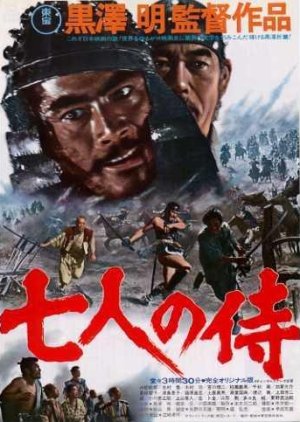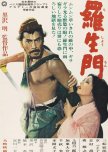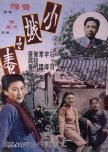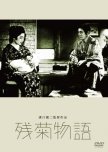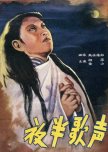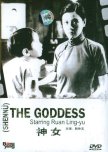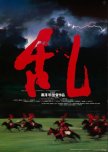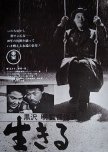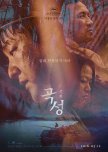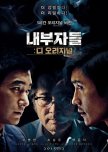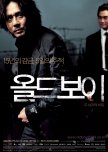
The movie takes place near the end of the Sengoku era; possibly the Azuchi-Momoyama period. Due to political unrest and military wars, there are plenty of ronin samurai roaming about, but there are also bandits. The latter terrorize local villages; simple farmers are robbed of their meager possessions, their harvest and their women. Undoubtedly, the farmers are forced to make a decision; they can either allow things to continue as is or... make a stand to fight and defend what is theirs. The villagers choose to fight back, but they are farmers, not warriors. They have no training in weaponry and they lack the necessary skills for battle. Therefore, they come up with a plan to hire ronin samurai to aid them in their fight to be free of oppression.
But, what does an impoverished village have to offer? Practically nothing, except the rice they have nurtured and grown all winter. Thus... their quest begins. A quest to find hungry samurai who will work for three square meals a day, instead of money.
Ultimately, the villagers are left feeling despondent, as their primary efforts appear futile. However, eventually they are able to procure five highly skilled samurai and two promising hopefuls.
I enjoyed each samurai character. Separate entities, different personalties and each had their own personal reasons for aiding the farmers. I, however, felt those reasons were vague and not clearly expressed in the movie, yet it enabled the viewing audience to reflect and draw their own conclusions. The animated series of Samurai Seven, I feel evoked more feeling into its samurai characters than the screen version.
Throughout the film, I found myself drawn to each samurai, as well as sympathizing the plight of the villagers. How could one not respect the efforts of Kambei Shimada (portrayed by actor - Takashi Shimura). He was the first to accept the villagers offer and began overseeing the recruitment of more samurai to the cause.
The skilled swordsman, Kyuzo (actor - Seiji Miyaguchi); even though his dialogue was minimal, I found him equally impressive. His stoic, no-nonsense character was one to get the job done with no questions asked.
Of all the seven, none compared to Kikuchiyo (actor - Toshiro Mifune). To me, his performance stole the show. Kikuchiyo's passioned speeches chastised both the samurai and the farmers, but it opened the door for acknowledgement of their differences and brought about an understanding of the two separate classes. Mifune's comedic antics kept the dire situation from becoming too solemn, thus uplifting the villagers spirits, as well as, entertaining an audience.
This classic is enriched with meaning; it also portrays both the social and economic history of feudal Japan in grave detail. Ultimately, Samurai Seven is a film that will stand the test of time. If you haven't seen it, then I highly recommend that you do.
Was this review helpful to you?

"When you think you're safe is precisely when you're most vulnerable"
Seven Samurai is not just a movie about fighting samurai, this film calls out the injustices prevailed on the common people by the warring ruling classes and class delineations. Kurosawa’s 3 ½ hour film would appear to be too long, and truthfully on previous viewings, I felt that way. But this time having learned to be comfortable with his world and character building, I settled in and watched as he wove a complex story out of a simple one. Kurosawa is a master at teaching and rewarding patience.“You all make great scarecrows. Problem is, the enemy isn’t a bunch of sparrows and crows.”
A small village of peasants whose crops are routinely plundered by the local bandits make a desperate all-in decision. Rather than risk starving and losing their women to the thieves they determine to find samurai hungry enough to protect them for food but not so strong as to be a more dangerous alternative than the bandits. Kambei is recruited first after he rescues a small child from a thief. From there Kambei puts together a team of six willing samurai. A seventh “samurai” refuses to be dismissed and follows them anyway. Kikuchiyo will prove vitally important as a link to the farmers. Kambei develops a plan to protect the village from 40 bandits on horses and armed with muskets with only seven warriors and untrained villagers with bamboo spears. Though the odds are not in their favor this new team of uneasy allies does not back down.
“In life, one finds friends in the strangest places”
The story occurred in one of Kurosawa’s favorite settings, the Sengoku period during the 16th century. While the classes were separated, there was still miniscule room for movement. At the same time, there was a belief that poverty and suffering was the fate for peasants and many of the samurai interviewed refused to help them. There was no reward, no chance for glory or increased rank, no lord to serve. Only those who enjoyed battle or were hungry or had sympathy for the peasants were willing to join.
“Who turned the farmers into such monsters?”
Civil wars had been devastating for the peasants who always have the smallest of safety nets in any time period. For these farmers, the samurai were not much different than the bandits. In a key scene, brilliantly played by Mifune Toshiro, Kikuchiyo upbraided the six when they were horrified to discover armor the farmers had stolen or killed fleeing samurai for. He quickly put things in perspective. Samurai murdered, pillaged, raped, and burned just as the bandits did only under the guise of “honorable” warfare, the end was the same for the farmers. Inviting samurai into their village could be the same result as bringing a tiger to the front door to chase wolves out the back. Someone always coveted the valuable rice and barley the farmers grew. Powerless farmers were left with little to barter with except their women and their lives keeping them in a perpetual state of fear.
“By protecting others, you save yourself”
Samurai Heihachi designed a flag displaying the growing cooperation between the disparate groups. Kambei and Kikuchiyo along with the other samurai and lead peasants forged a transformation of societal boundaries. The two sides slowly learned to trust each other building something new and important. But would it last?
“There’s nothing heroic about selfishly grabbing for glory”
Kurosawa regular Shimura Takashi played Kambei Shimada, the leader of the samurai. This is by far my favorite role of his despite loving Ikiru. Shimura was calm, wise, wily, and also had a sense of humor. He owned every scene he was in and it was quite believable that he instilled confidence and commanded respect from both samurai and villager. His performance was brilliant as the leader who eschewed the need for glory and demanded complete selflessness. Another Kurosawa regular, Mifune Toshiro, and one of my favorite actors, played the slightly and sometimes not so slightly, unhinged Kikuchiyo. It was a role similar to the one he played in Rashomon. Overflowing with kinetic energy and emotion, he never stepped out of character, never reverted to the ultra-cool samurai he was capable of playing. Kimuro Isao as the youngest samurai, Katsushiro, displayed the awe of the men around him and the fear of first battle and first love. The other samurai were capably played and carefully developed as individual characters instead of bland backdrops. Even several peasants were highlighted.
“I defended my post”
Using his three-camera technique for the first time, Kurosawa blended the action to convey the tension of death and battle. His customary blowing dust skittered across the scenes as moods changed. While there was emotional music, his most successful background sounds for me were the beating drums of war approaching even as songbirds sang and flowers bloomed. As the rain fell during the final battle, it was hard to distinguish samurai from peasant. Side by side they fought viciously and heroically regardless of the consequences, regardless of rank, regardless of whether they or their alliance survived. Seven Samurai fought not only bandits but distrust and social injustice with only one side in the triangle of power capable of winning. If you can let Kurosawa slowly envelope you in this world he created with good and evil and every shade of gray in between you’ll be rewarded with a captivating film superbly made.
27 March 2024
Was this review helpful to you?

"The Seven Samurai" is like describing the summit of Everest, the holy grail of the seventh art
This film is one of the best I have ever seen. You don't see the time passing, so much the story takes you away and the rhythm is sustained.Kurosawa's way of shooting has inspired many westerns (including an American adaptation : the Magnificent Seven by John Sturges) and this is understandable when you look at the superb sequence shots that punctuate the film.
Kurosawa also manages to develop his characters like no other and succeeds in making them endearing and more profound than their apparent superficiality would suggest.
The actors also play their respective roles brilliantly. Toshirô Mifune, to name but one, plays his character of Kikuchiyo to perfection and manages to make him credible despite his lack of seriousness.
The music also contributes to the special atmosphere of the film and the silences are perfectly distributed.
So to conclude my review:
Arm yourself with an open mind to discover the great Japanese cinema.
Be prepared because the film lasts more than 3 hours but it will open the doors to a black and white show which will transport you into a story such as one rarely encounters in the cinema nowadays.
Quite simply a masterpiece!
Was this review helpful to you?

This review may contain spoilers
Maybe the most influential story of all time
Instant classic. The movie is pretty much immaculate. The only things I'd point out as less than stellar, Kikuchiyo'death being not as impactful as it could've been, are minicule and nitpicking at best.The pacing is perfect. A 3 hour run time can put most die hard movie fans off, but the gripping storytelling, acting from all of the cast with such range of emotions - heartfelt to dramatic - and cinematography just catches you and never let's you go until the title cards say "The End".
Takashi Shimura, Isao Kimura and Toshiro Mifune all give exceptional performances. The wise veteran, giving wisdom, the naive protoge and the brash unpredictable rogue. Mifune steals any scenes he's in with his charisma, his energy, his range and the weight behind everything he says. You could follow him for the run time and be just fine.
Kurosawa's masterpiece, indeed. Every shot is beautiful. Timeless direction and camera work.
Was this review helpful to you?

Aaaaaaaaa
Aaaaaaaaaaaaa
Aaaaaaaaaaaaasss
Must watch!!!
I’m not good to write long essay in reviews! ?
But this movie is really great!!!!
Totally recommended!!!
Aaaaaaaaaa
Aaaaaaa aaaaaaaaaa
aaaaaaaa aaaaaaa watch this movieeee!!!! Aaaaaa aaaaaaaaa
Was this review helpful to you?

This review may contain spoilers
A piece of epic film history.
Dark sky, gray shadows moving across the ridge. Akira Kurosawa could get top marks for Seven Samurai just because he created the legendary war scene where a troop of soldiers ride over a hill on their way to the battlefield, or because he wrote side-long backstories about each leading character and made an intricate family tree over the 101 villagers. This is an epic mammoth film, but today perhaps best suited for cineastes.The plot is simple: Japan, 16th century, feudal society - It's sweaty, dusty and bloody, especially if you're a peasant. The population of the small mountain village is constantly subjected to bandit attacks, especially in the fall after the year's harvest. The men in the village therefore decide to hire 7 samurais to protect them from the horrible miscreants. The first man to stand up is the wise Kambei, who later hires 6 more ronin. Is this incredibly exciting? Absolutely, if you're willing to spend 3.5 hours watching dramatic Donald Duck-clad men laughing at jokes no one else understands. But if you want to see who combined it first: Slow motion + young woman falls in love with young fighter + group of heroes helping each other + men on a hill, this is where you should turn.
Just the intro is a 3-minute long explanatory text passage accompanied by pompous taikos. But hold on. From the first scene you are struck by the astonishing photo. Akira knew how to use the black/white format to the max. Small details such as the characters' patterned kimonos increase the nuances and make each frame attractive. The director recorded each scene with dual cameras in order to have a larger selection of images when editing. It's noticeable, because it's a fantastic variety of angles and perspectives. Some images are so beautiful that you could frame them as individual photographs. I especially fell for the contrast of the white daisies against the dark tree trunks. The sound effects and music are also interesting. I laughed out loud towards the end when the young woman whistled for a full hall. There are creaking hinges and humming men, but it never becomes blaringly loud, instead the music and sound effects stay in the background and act as a mood setter.
Although the film is, according to some, the first drama-action film, Akira has had his heart in the right place. Unlike now, the heroes aren't nerve-smooth and pumped with anabolic steroids. Here, the men have lovely round bellies, wrinkles and they actually cry when their pals die. The masculine lies in their enormously pent-up sexual frustration and that around every corner there seems to be a woman in distress with a crying child in her arms. The young woman who has a fling with the young wanna-be samurai is the only girl who has lines. I have full respect for that because the movie is from 1954. What scares me is rather the realization of how little the genre has developed since then: Braveheart, Gladiator, Kingdom of Heaven.
Just the comparison between this and more recent drama-action films makes me understand how big an influence it must have had. Not only because it is innovative but also because the story is emotionally driven. The atmosphere breathes gloom. The only thing I miss are characters that develop this way despite Akira's solid preparatory work with the portraits. It's only the funnyman Kikuchio who undergoes a major change. Despite the massive playtime, I never get a chance to go deep with a select few. Therefore, I don't really get emotionally involved in how the villagers and samurais are doing. This also applies to the dark forces that move around the village, the bandits, they have no face. They are more like a brutal, black shadow that thunders forward and devours everything in its path.
Despite its few flaws, it is still incredibly well made and interesting from a film historical perspective, but I think it takes a cineaste to really appreciate it. If you like to Google everything about the film after you've seen it, to create an overall picture and be able to put it into context, then you're the right audience.
Was this review helpful to you?

I could watch this every day if I had the time!
The difference between a good and a great movie is being its ability to make the viewer FORGET that he/she is watching a movie! The first time that this happened to me was watching SEVEN SAMURAI in high school!SEVEN SAMURAI is one of those movies; I probably will never see another movie that meets its standard of excellence (I will keep searching, though)!
Every and every scene seems to be in concert with each other scene; I have watched it several times and the only mistake I have ever seen is the rapid fire of the old matchlock in rapid succession (the samurai had already stolen the first two matchlocks from the bandits, leaving only one in possession of them!). But I still give it a perfect 10 anyway...
He uses the elements, music and other segways to change scenes and to enhance your understanding of his masterpiece;
if you get a copy of the DVD and listen to the commentary provided, many unknown facts about the director, cast and the set itself is revealed; this runs the entire length of the full movie if you wish to see the commentary in its entirety; you can turn the commentary on/off if you want the movie only with the DVD as well.
Although there is violence and death in this movie, there is no gore, another reason that it has survived the test of time in cinematic history.
For the romantic, there is a 'love story' segment running concurrently with the major theme, but no nudity to satisfy the romantics in the audiences around the world.
An arts instructor in high school played this movie to our class, which extended past the normal hours of school in order to see the whole thing uncut. The only thing wrong with that showing was it being in the original language and I was so delighted when an English subtitle version came to my knowledge online.
The first time I saw this, an arts teacher told the class what was being said and the second time a Japanese student I was tutoring in English as Second Language told me what was being discussed in the dialogue; having an English version of this made me so much more respect the director's genius in making this film, as I was able to follow the dialogue directly.
Being a history buff, I love the scenery and history conveyed by this movie; as well as the traditions portrayed. Also, as the main samurai Kambei Shimada (actor Shimura Takashi) said near the end, only the farmers won after the third day of the fighting between the samurai and bandits.
Farmers have always been the mainstay of every culture and society throughout history; however, those who mooch off of society always consider them the lowest form of human beings in order to justify their theft of a farmer's livelihood at no or little cost.
Every time I watch this movie, i see something else that I missed in the last and previous viewings; it is like a jewel chest that, when opened, shows some other facet of itself each time you open it...only a movie like THE ROCKY HORROR PICTURE SHOW comes close to this genius part of the movie!
I also like how each samurai, besides being a master of the sword, lent their individual skills training the farmers in fighting techniques or contributed their organizational skills in setting up the defenses of the village or their leadership in the battle itself (as samurai Katayama Gorobei [Inaba Yoshio] did).
Lastly, there is a story of class division which I was not so much aware of until an English version came out; sadly, no progress came from this in our world but as always, the elite of every society wish to keep the military of a culture and its citizenry at odds with each other for a reason.
The entire cast worked well together in making this a masterpiece of Japanese cinema; however, I know from other readings that they also were allowed to improvise somewhat in their individual scenes, which Kurosawa Akira allowed. Only a great director can blend a script and an individual's improv in making of a movie.
This great movie has been translated into over 275 languages! If you know of any other movie that beats this record, please let me know!
I now posses a DVD of this great movie and play it 2-3 times a year.
The only other director who brilliance could come close to making a movie as great as SEVEN SAMURAI would be the director of ROSHOMON...in my opinion.
Was this review helpful to you?

